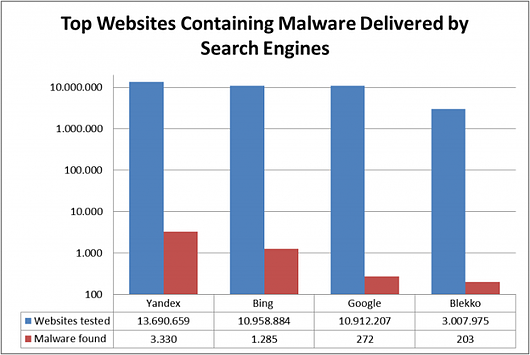Question of the week: Since I have been using avast! I have been conscious of staying secure online. Does it matter which search engine I use? Is one safer than the other?
Thanks for using avast! to protect your computer. Yours is a great question, but maybe not one that people consider when thinking about the security of their system.
A recent 18-month study by the German Security firm AV-TEST Institute revealed that search results about breaking news stories, like the recent bombing at the Boston Marathon, frequently contain malicious links. People seek news quickly and they click on the links at the top of results without stopping to consider their safety or reliability. PCs without reliable security software soon become infected.
Google search is safer than Bing
AV-TEST evaluated about 40 million websites and found that Google is the safest way to search if you want to avoid malware. It’s rival Bing delivered five times more malicious websites in search results than Google. Yandex, Russia’s popular search engine, performed even worse than Bing delivering 10 times as many infected websites as compared to Google. This chart shows the results from Yandex, Bing, Google, and Blekko.

Overall the number of infected websites represent a small overall percentage of search results. But you need to remember that Google handles 2 to 3 billion search requests worldwide every day. The editors of the study point out, “If this total is factored into the calculations, the total number of websites containing malware found by the search engine is enough to make your head spin!”
Even though the study indicates that Google is the safer bet, all the search engines are pretty safe. As a conscientious user, you just need to be careful what you click on and make sure your programs and applications are up-to-date. Of course, you are already covered by terrific protection – avast! Antivirus! ;-)
Additional information:
Microsoft response to AV-Test- "We show results with warnings for about 0.04% of all searches, meaning about 1 in 2,500 search result pages will have a result with a malware warning on it. Of those, only a small proportion of malicious links ever get clicked and the warning therefore triggered, so a user will see the warning only 1 in every 10,000 searches. In any case, the overall scale of the problem is very small."
Yandex response to AV-Test - "Yandex uses its own proprietary antivirus technology to protect users from malicious software," reads an email from the company. "Yandex marks the infected webpages in its search results in order to notify users of unsafe content. We just notify users of possible consequences and do not block access to the webpage completely."